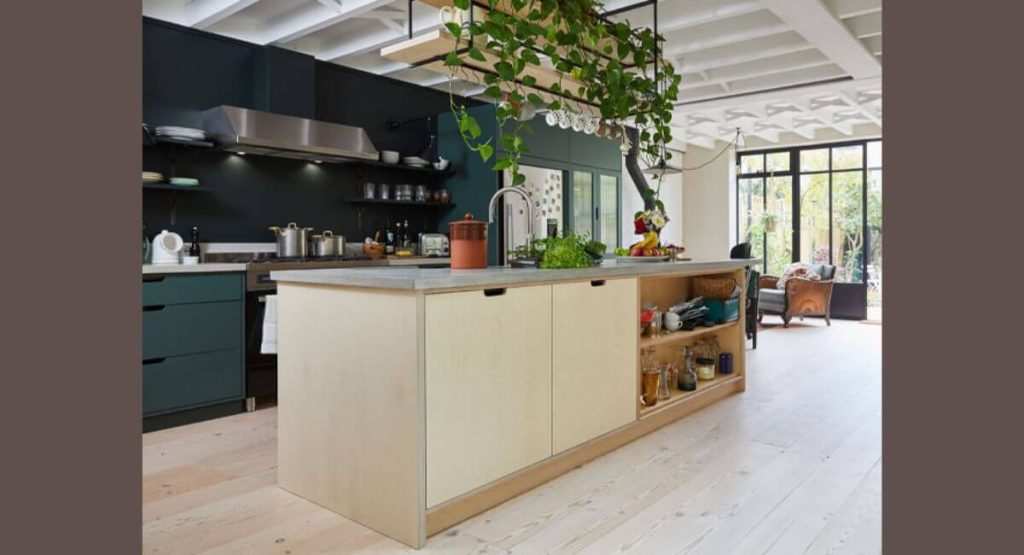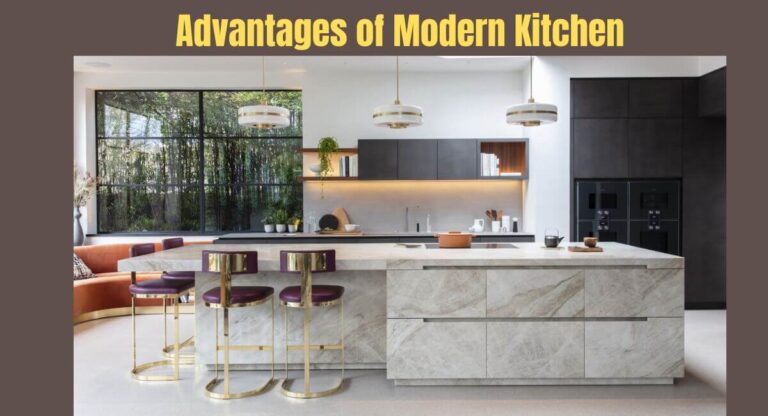Modern kitchens have come a long way from the traditional, utilitarian spaces of the past. Today’s kitchens are designed with function and style in mind. In this article, we’ll explore the Advantages of modern kitchen and how they can enhance your daily life.
The functionality of a Modern Kitchen
With the right design and functionality, a modern kitchen can become a comfortable, efficient, and practical space that makes daily life easier and more enjoyable.
Designing Your Kitchen: Finding the Perfect Layout
When it comes to designing a modern kitchen, the layout is crucial. One of the most popular kitchen layouts is the L-shaped kitchen, which features two perpendicular countertops that form an L-shape. This layout is perfect for small and medium-sized kitchens, as it maximizes storage space and provides ample room for food preparation and cooking.
Another popular layout is the U-shaped kitchen, which consists of three walls of cabinets and appliances. This layout is perfect for larger kitchens and provides ample storage space and room for cooking, baking, and entertaining.
Kitchen Cabinets: Storage and Style
When it comes to kitchen cabinets, storage is critical. Modern kitchens require ample storage space for pots, pans, dishes, and other essentials. However, cabinets should also be stylish and complement the kitchen’s overall design.
One popular trend in modern kitchens is open shelving, which provides a sleek and minimalist look. Open shelving also allows you to display your favourite dishes and kitchen accessories, adding a personal touch to your space.
Another popular trend is two-tone cabinets, combining two colours or finishes to create a unique and stylish look. This trend is a perfect want to add a pop of colour to their kitchen without overwhelming the space.
Countertops: Beauty and Durability
When it comes to kitchen countertops, beauty, and durability are equally important. One popular option is granite, known for its durability and natural beauty. Granite countertops come in various colours and patterns, making it easy to find a style that complements your kitchen design. Another popular option is quartz, a manufactured material with the same durability and beauty as granite.
Flooring: Style and Functionality
When choosing to floor for your modern kitchen, it’s essential to consider both style and functionality. Modern kitchens require durable, easy-to-clean, and stylish flooring.
One popular option is hardwood flooring, which offers a timeless and elegant look. Hardwood flooring is also durable and easy to clean, making it an excellent choice for busy kitchens. Another popular option is tiling flooring, which comes in various colors, patterns, and textures. Get to know about The Benefits of Instagram for Personal Use.
Lighting: Functionality and Style
Lighting is another crucial element of a modern kitchen. A well-lit kitchen is more functional, inviting, and comfortable. One popular trend in contemporary kitchens is recessed lighting, which provides a sleek and modern look.
Design and Aesthetics of a Modern Kitchen
The design and aesthetics of a modern kitchen have evolved over the years. That Advantages of modern kitchen focus on creating a functional and visually appealing space.
Layout and Functionality
When designing a modern kitchen, the layout, and functionality are key. The form should be prepared to maximize the use of space and allow for easy movement between different areas of the kitchen. The three main types of kitchen layouts are U-shaped, L-shaped, and galley. Each design has its benefits and drawbacks, and the choice ultimately depends on the specific needs and preferences of the homeowner.
In terms of functionality, the kitchen should be designed to accommodate the homeowner’s needs. It includes enough counter space for meal prep, pots, pans, and storage of utensils, and easy appliance access. The appliances themselves should be selected based on their functionality and energy efficiency.
Materials and Finishes
The materials and finishes used in a modern kitchen can significantly impact its overall aesthetic appeal. Some popular materials for kitchen countertops include granite, marble, quartz, and butcher block. Each material has its unique look and feel, and the choice ultimately depends on the homeowner’s style and budget.
When it comes to finishes, matte finishes are becoming increasingly popular in modern kitchens. They offer a sleek and contemporary look and are available in various colors and textures. Another popular finish is a high gloss, which provides a more modern and dramatic look.
Color Scheme
The colour scheme of a modern kitchen can significantly impact its overall aesthetic appeal. However, pops of colour can also be incorporated through accent pieces, such as a colorful backsplash or vibrant kitchen accessories.
Lighting
Lighting is an essential element of any modern kitchen design. It should be designed to provide adequate task lighting for meal prep and cooking, as well as ambient lighting for socializing and entertaining. Under-cabinet lighting is a popular choice for task lighting, while pendant lights can add a touch of style and elegance to the space.
Storage Solutions
Storage is a crucial element of any kitchen design, and modern kitchens are no exception. Built-in cabinets and drawers offer a clean and streamlined look, while open shelving can add a touch of personality to the space. Other storage solutions, such as a pantry or a kitchen island with storage, can also be incorporated to maximize space and functionality.
Safety and Health Benefits of a modern kitchen
With the rise of modern technology, modern kitchen have Advantages for safer and more health-conscious.
Safer Appliances
Old, outdated appliances can pose serious safety risks, from electrical hazards to gas leaks. On the other hand, modern appliances come equipped with advanced safety features that reduce the risk of accidents and injuries. For example, some ovens now have automatic shutoff features that turn the oven off if it gets too hot, preventing fires. Other appliances, such as dishwashers, have child locks that prevent curious little hands from accidentally opening them during operation.
Non-Toxic Materials
Another important consideration for a modern kitchen is the use of non-toxic materials. Many traditional materials, such as lead-based paint and asbestos, have been linked to severe health issues, including cancer and respiratory problems. Today’s kitchens utilize a wide range of safe and eco-friendly materials, such as granite countertops, bamboo flooring, and low-VOC paint. These materials not only reduce the risk of health issues but also help to promote a healthier environment.
Improved Air Quality
Advantages for Modern kitchens is about improved ventilation systems that help to promote better air quality. Poor air quality can lead to health issues, from respiratory problems to allergies. Many modern kitchens have high-quality ventilation systems that effectively remove smoke, fumes, and other airborne contaminants. Some of the latest techniques even come with innovative technology that monitors air quality and adjusts the fan speed accordingly.
Enhanced Lighting Good
Lighting is essential for any kitchen, as it helps to prevent accidents and create a warm and inviting atmosphere. Modern kitchens take this to the next level with enhanced lighting options, such as LED under-cabinet lighting and task lighting. These features not only provide better visibility but also help to create a more stylish and modern aesthetic.
Smart Appliances
One of the most exciting developments in modern kitchens is the rise of smart appliances. These innovative appliances have advanced features such as touchscreens, voice control, and Wi-Fi connectivity. Intelligent devices make cooking more accessible and convenient and offer enhanced safety features. For example, some smart ovens have built-in cameras that allow you to monitor your food from your phone, ensuring that it doesn’t overcook or burn.
Ergonomic Design
Advantages of modern kitchen is about design with ergonomics in mind, ensuring they are both comfortable and safe to use. Modern kitchens are designed to minimize strain and reduce the risk of injury from adjustable-height countertops to pull-out drawers and cabinets. It is crucial for people with mobility issues or disabilities who may require a more accessible kitchen.
Environmental Benefits of a Modern Kitchen
The kitchen, in particular, is an area where we can make significant changes to benefit the environment.

Energy Efficiency
Modern kitchen appliances have advantages to use less energy and are more efficient than their older counterparts. Upgrading to energy-efficient appliances such as refrigerators, dishwashers, and ovens can significantly reduce energy consumption and lower utility bills.
You can also reduce energy consumption by installing energy-efficient lighting, such as LED bulbs. Replacing all your light fixtures with LEDs can reduce your energy consumption and save money in the long run.
Water Conservation
Another area where you can significantly impact the environment is by conserving water in your kitchen. There are several ways to save water, such as installing low-flow faucets and aerators. These devices can reduce water usage by up to 50% without affecting performance.
You can also conserve water using a dishwasher instead of washing dishes by hand. Dishwashers use less water and are more efficient at cleaning dishes than handwashing. Additionally, you can save water by only running your dishwasher when it’s complete.
Recycling and Composting
Recycling and composting are essential for reducing waste and conserving natural resources. You can recycle materials such as glass, plastic, and aluminium in the kitchen. You can compost food scraps and organic waste to create nutrient-rich soil. By composting food scraps, you can reduce the amount of waste sent to landfills, which reduces greenhouse gas emissions. Composting reduces the need for chemical fertilizers, which can harm the environment.
Sustainable Materials
When designing a modern kitchen, it is essential to consider the materials used in its construction. Sustainable materials bamboo, cork, and recycled glass are environmentally friendly and can add a unique touch to your kitchen design. You can also use recycled materials for countertops and flooring. These materials are durable and can reduce the amount of waste sent to landfills.
Reducing Food Waste
Food waste is a significant contributor to greenhouse gas emissions. You reduce food waste in the kitchen by planning meals, buying what you need, and storing food properly. You can also use leftovers to create new meals and freeze excess food for later use. Reducing food waste can save money on groceries and lessen your environmental impact.
